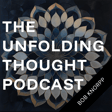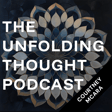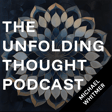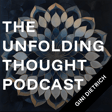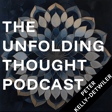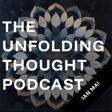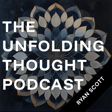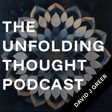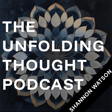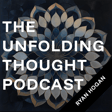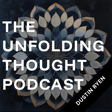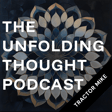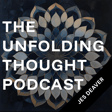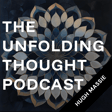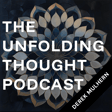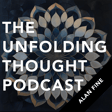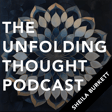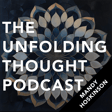Introduction to Unfolding Thought Podcast
00:00:03
Speaker
Hi, I'm Eric Pradham. Welcome to the Unfolding Thought Podcast, the show for leaders and deep thinkers who demand more than the usual fluff. If you're the kind of person who moves on from a book, video, or podcast the moment it stops making you think or introducing you to something you can use, I hope you'll feel right at home here.
00:00:25
Speaker
In each episode, we uncover the deeper, often overlooked forces that shape our thoughts and behaviors so you can see yourself, your team, and the world from a whole new angle and then actually apply what you learn to grow and do better.
00:00:42
Speaker
On the Unfolding Thought Podcast, we aim for minimal filler and maximum insight, challenging assumptions and sparking new thinking every step of the way. Are you ready to dive deeper?
00:00:55
Speaker
Then let's get started.
Interview with Keri Zeller on Leadership in Change
00:00:57
Speaker
Have you ever dealt with a period of significant change, making major investments in training, technology, process, or maybe even sacrifices so that you could save people's jobs only to feel like your efforts or investments fell flat?
00:01:15
Speaker
In today's episode, I speak with Keri Zeller, founder and CEO of TGN Consulting, who talks to me about how one of her first big experiences with leading real change and settling for results that are nothing less than top level came during her deployment in Operation Iraqi Freedom.
00:01:35
Speaker
We discussed transitioning from being a military officer to leading consulting for large and high-profile clients in order to help them navigate the human complexities of mergers, pivots, transformations, and significant organizational shifts.
00:01:54
Speaker
Throughout this conversation, you'll hear about Carrie's focus on human-centered mobilization and why clarity of vision, engagement, and aligning people with goals matter so much more than traditional change management tactics, and why embracing human messiness is not just a soft skill that we can brush off or undervalue.
00:02:18
Speaker
And now ah bring you Keri Zeller. Keri, thank you for joining me. Would you mind telling me a little bit about yourself? Yeah, thank you for having me. i am a mother.
00:02:29
Speaker
i live in Colorado. I'm a backcountry skier. I love adventure. and And for work, I spend a lot of my time working with leaders, ah executives, their teams and their organizations and in mobilizing around pretty big futures So whether that is a strategic pivot or it's an org redesign, maybe there's been an acquisition or a merger, you know, you might call those really big changes.
00:03:03
Speaker
And my work is really centered around the clarity of the future. And then how do we really mobilize, you know, our teams, ourselves, and our workforces to realize that future?
Leadership Challenges and Transformation Experiences
00:03:18
Speaker
If I recall correctly, i read that you were in the Air Force. Is that correct? I was in the Air Force. Yes. And I think you have it on your website and or LinkedIn that your first experience of organizational transformation or something along those lines was in a bunker.
00:03:42
Speaker
The first experience that I had truly of an organizational transformation was me leading one as a lieutenant in during Operation Iraqi Freedom.
00:03:56
Speaker
So i was i was stationed in Kuwait. And, you know, I arrived, it was i think it was back in 2005 maybe. It was quite a while ago. And I arrived into a unit that, you know, we were okay.
00:04:09
Speaker
It was a bit... It wasn't great, actually. I wouldn't even say it was okay, to be honest with you. It was, you know, a substandard, really. You know, we weren't even truly making the standards that we were supposed to be making.
00:04:25
Speaker
But, you know, as you arrive, you see, oh you guys are working out of that bombed-out shelter. So here I am with my troops. With my airmen and as aircraft maintenance, that was my my background, Air Force Academy grad, so so I was an officer.
00:04:42
Speaker
And chose aircraft maintenance, by the way. That's what I wanted to do. And, you know, what where we got stationed, where we got placed was this this bunker.
00:04:54
Speaker
So I guess it is true, was a bunker. It's a bombed out bunker from the first Gulf War. And it was a little disconcerting because, i mean, it's not like we were put in there for safety's sake.
00:05:07
Speaker
Because there's a big hole, you know, in the top of the bunker where even during the monsoon season, we weren't even protected from the rain. Right? So it's like, well, this didn't work.
00:05:18
Speaker
But you're putting us in the one that didn't work and it has a big hole in it. So we simply constructed almost like a mobile home inside of the bunker. That's another story for another time because there was like an acre of land right next to the bunker that...
00:05:34
Speaker
we didn't construct something on, which, you know, by the time I left, i was like, could we just make something there? and And the answer was yes, we never thought of that. And it was so alarming.
00:05:45
Speaker
and But it it says to what I arrived in, which was, You know, we would come in and come out. You know, people would rotate in, don't know, six months or so. And you'd come in for six months and you'd leave.
00:05:56
Speaker
So this was nobody's home, right? We were just here for six months and gone, right? So there wasn't agency. There wasn't ownership. We had fairly mediocre tools, to be honest with you.
00:06:08
Speaker
you know Keeping the missions going, we had a pretty pretty ah barely making it kind of standardization. were supposed to hit like a 75% mission, you could call accomplishment or mission capable rate, and we were hitting about 65%.
00:06:25
Speaker
You know, we'd have pretty big, pretty bad repeat, you know, maintenance. People take off and or not people. Airplanes would take off and come back. They'd have a problem and, you know, we would fix it.
00:06:36
Speaker
They'd take off and have to come back for the same thing. You know, that's not that's not good. ah It wouldn't be good for business if we were for profit company. So but things were kind of OK. And and yeah I don't know, we were just we were just there like we'll put up with it until we leave.
00:06:53
Speaker
It's fine. It's like five, six months. We can we can deal with this until we leave. And it wasn't until I actually got the call to go into Balad where I really got the firsthand experience and the firsthand knowledge of what we were really doing there.
00:07:09
Speaker
Right. So one of our aircraft had been hit by a surface-to-air missile. We had to, I to take a troop, it's called a maintenance recovery team, into the area, into Iraq, to fix the aircraft to bring it back.
00:07:23
Speaker
Right. Right. And, you know, and that's when things really got real. Kuwait, it's where the Marines would come for their own R&R. And, you know, there was like a swimming pool, right? Like, yeah with you were deployed. It was very hot, but it wasn't really a hardship compared to, you know, Iraq or Afghanistan.
00:07:42
Speaker
And so when I really went into Iraq and I said, oh, my gosh, right, like this is This is where aircraft are going. This is where the supplies are going. You know, when but those troops get on our aircraft, we're sending them, they're really needed. And all of a sudden, a 65% mission-capable raid and a, you know, I can't remember the repeat, but the repeat failure was really unacceptable.
00:08:06
Speaker
it It truly was unacceptable, right? Because I went into Iraq and, and you know, that's when the more I got to experience those mortar attacks, I got to experience not necessarily what many Army and Marines and some of those guys experienced on the ground in the fight, but certainly was at the base in the fight. And so things got really meaningful.
00:08:27
Speaker
So when I came back from that, and what I really saw was even, you know, some of our aircraft that had like radar jamming equipment, things like that. When they don't fly, you know, you i i kind of had this, the bit of a mantra for myself, which is like, man, when we don't fly, people die.
00:08:42
Speaker
They're not getting the supplies. They're not getting, you know, new troops, fresh people. They're not getting radar jamming happening. So it was all of a sudden aircraft maintenance, right?
00:08:53
Speaker
Which seemed like, oh, we're just going to put up with this desert place with mediocre tools and equipment. And, you know, it's fine. We'll get home soon. That was absolutely unacceptable.
00:09:05
Speaker
And and it just didn't didn't look like that when I showed up. And so when I came back from that first recovery team experience, things had to change. And so, and i I had to start, you know it really did start with me. And that's what we find when we do organizational transformation.
00:09:21
Speaker
Is if the executives and the leaders aren't leading it, it's not going to happen. Right. And so it must always start with those executives. My partner has a term, the fish rots from the head, which, you know, we really only say among ourselves, but it's true.
00:09:35
Speaker
And I feel like I can say that because that happened for me, you know, as the leader goes, so does
Vision and Perspective in Organizational Change
00:09:39
Speaker
the organization. Right. And so so that's but that was my own, in my own personal shift, I was then able to lead a shift because I now could stand for something.
00:09:50
Speaker
I could stand for what it should look like. I could say, you know, you can't pencil whip things anymore. You know, we actually need to do that work. We need to do the good work. And and we I will say we actually turned our unit completely around.
00:10:02
Speaker
But again, it didn't happen just by virtue of me. i had to learn some hard lessons around mobilization. You know, if the chiefs, if the senior enlisted weren't bought in, also that was not going to happen, right? If they didn't have an opportunity to contribute, to to say what it should look like, to shape the future, to galvanize that next level, they knew how to communicate better With the next level down than I did.
00:10:27
Speaker
Right. So I really i learned some really critical lessons who, you know, who we knew ourselves as we, you know, we were the the E models we we fix the aircraft that were used in the Vietnam War.
00:10:41
Speaker
Right. So we worked out of the bombed out shelters and bunkers. Right. So we had to shift who we were for ourselves, our own identity. We had to say, and then we had to shift the way our routines and what our day-to-day work looked like.
00:10:56
Speaker
And we we had to shift the way we spoke. and We had to shift the things that we reinforced. and And I certainly, a You know, i was very young. i was that was like 26 or something like that, 25, 26.
00:11:10
Speaker
And the people, the next in line, my chiefs had daughters that were my same age. So I certainly didn't have enough credibility to just tell people what to do. Right. I had to engage people and I had to engage their interest in what they cared about. And I had to make sure that they saw something.
00:11:28
Speaker
They got to be someone bigger in that change. Right. um So that's what the you know that that's when I started to really learn about mobilization. Well, first and foremost, sounds like while you're saying, course, that everyone's experience is different, people do different kinds of work in different locations under different stresses, that you were doing important work and work that impacted not just the work of others, but sounds very clearly like their lives. So for my own part, thank you for your service.
00:12:02
Speaker
Thank you. And then i think part of what I hear you saying is that some of the change that you needed to bring about had to come through winning others over or helping them buy into new behaviors and maybe new goals, if I can put it that way.
00:12:28
Speaker
One of the principles that we really work with is the difference between being in the stands, like you can imagine, ah you know, in your favorite sports, right? You're in the stands and you're looking down on the court.
00:12:39
Speaker
Like say basketball or I work a lot with Canadians, so ice hockey, right? So you're you're in the stands, you're looking down on the ice or down on the court. That's a different view. So I think from in the stands, that's the right way to say that.
00:12:52
Speaker
Right. It's what am I observing? Right. How would I explain what's happening on the court? But then when you're on the court, it's a really different view. Right.
00:13:03
Speaker
So I think in the stands, we say get their buy in to go after the goals you want. It's like, OK, the you know, you kind of comment and explain and have opinions from the stands on the court.
00:13:15
Speaker
it It looks really different. It's ball. You know, i'm like here and the balls. What you see is the way the ball is rotating towards you. So I think from on the core, it's a little bit more like it feels more like a co-creation. It feels more like I get to be part of that future.
00:13:32
Speaker
but So the reason I don't love buy-in is because it's like as if I know where to go and I just need to convince you to go that way. From on the core is a little bit more like I have a say and I'm engaged in authoring the future here.
00:13:47
Speaker
it It's guided in a way that it's not like anything goes. It's not like we're, you know, I'm going to give up this military thing and I'm just going to like create a lemonade stand. Like, it's not like that, but it's, it's you know, given these parameters, how's it going to go for us? What's important to you?
00:14:03
Speaker
So from on the court, it looks like what's important to me gets included and thought about in this future you're going after. So I'm invested. i have agency. I see my part.
00:14:15
Speaker
I see the picture of what it looks like, you know, and i I can, I'm part of that plan. I can see how I actually plan that out. Right. So um and then what I really care about gets addressed in some way, may may not, maybe not entirely, but it it's considered in that.
00:14:36
Speaker
Right. So I think
Alignment and Decision-Making Across Levels
00:14:37
Speaker
that's a different it's a little bit different way of looking at it, if that makes sense. It seems to me like you are not trying to get people to see your way as much as you perhaps are trying to bring out that we both want to go to the same place.
00:14:57
Speaker
And so now together, can we figure out how to work the puck or work the ball so that we end up succeeding? In general, people have a lot less trust in their fellow humans than they could.
00:15:13
Speaker
And when you don't have trust, you try to control, coerce, manipulate, incentivize, which is not bad. Like, you should your incentives definitely should be aligned. Incentives aren't bad. That's kind of, it's a fun thing. But when you rely on them, you know, it's that old issue where if you do too much external incentivization, you take away that internal, right?
00:15:34
Speaker
But what I find is my team and I, you know, we just have so much trust in in and we've just seen it so many times that when humans are actually heard, when they feel like, OK, you have you you at least have what I deeply care about in mind when you're making decisions and taking actions. Maybe it doesn't go my way, but at least I can see that you understand where I'm coming from.
00:16:01
Speaker
OK, and that you see what I see. See, if you see what I see, you truly see what I see and you at least understand what I care about. Right. It's really easy for me to start to engage in where you want to go.
00:16:13
Speaker
And and we just it's so simple, but we skip over that step. So what we find most often is when we can clear out of the way Whatever is getting in the way of of of people actually being able to hear and see from from the different important perspectives and also speak from their own position.
00:16:43
Speaker
When you can get the the garbage and the friction out of the way for that, people tend, they have a natural inclination to mobilize towards a better future.
00:16:56
Speaker
So what gets in the way of that is either I'm pretty resigned that there could be a better future. I don't trust you enough to actually speak up in a way that I think is going to be like the the cost of speaking up has to be lower than the benefit of speaking up.
00:17:11
Speaker
OK, so but when we're able to do our work, we're just kind of clear some of that out of the way time and time and time again. we have found that people naturally align toward a better future.
00:17:23
Speaker
The most important thing is giving each person involved in that part of that puzzle piece. And and it's difficult to hear the puzzle piece, right? So, you know, if you're at the top of the organization, that those in the front lines, they do not see what you see.
00:17:37
Speaker
They just can't. You know, they have really great ideas that make their life better, but they can't see that, you know, we have bank covenants, we have like... We have all this stuff to deal with. Of course, it would be wonderful if we just built you a new building or gave you this new technology and we hired a bunch more labor, but then, you know, we couldn't afford you.
00:17:56
Speaker
Right. So like they just don't understand the tradeoffs that you see from your position. The opposite is true, too. It's near impossible for an executive to see the front lines perspective. And but they're making tradeoffs, too.
00:18:10
Speaker
And if the communication isn't aligned, we're pushing down trade-offs to a front line in a way where if we can't if we can't surface breakdowns, if we can't talk about wherere where we're going, they have to make decisions.
00:18:23
Speaker
And sometimes the decisions and the trade-offs they're making are not the ones you want them to make. But because you refuse to see what they're actually dealing with, you can't help solve the problem.
00:18:36
Speaker
Right. And that's one of the things we see over and
Transition Lessons: Military to Civilian Life
00:18:39
Speaker
over. It's like they're just not doing their job. Right. Or all they care about is money or the benefits. No, you may have pushed them to only care about the benefits because that's all that's left for them.
00:18:50
Speaker
Right. The people very much care about their identity, who they are in this organization. They care about their future, who they get to be in that future. Does it, you know, address what they care about? And they care about their day to day reality.
00:19:03
Speaker
What am I doing? Who am I doing it with? You know, who's who's leading me to care about those things a lot? And many people really care about doing a good job. You've just made it really hard for good people to do a good job.
00:19:15
Speaker
You know, they got to work around you and survive you and and make trade-offs so they can and You know, one one one very simple example is when you don't really listen to, I don't know what to prioritize. I feel like I have too much. We're like, no like I could do that. ah You don't have too much. What are you possibly doing? And just kind of dismiss that.
00:19:35
Speaker
What happens is then people make a decision on they're either going to do one thing. They have to decide what not to do or they decide to do both, but kind of it half ass. But they have to make you're making them make that decision.
00:19:47
Speaker
Right. Maybe they could do it better. But what they're saying is they don't know how. yeah so So all that aside, what I'm saying is when you actually can, when you can clear the way so that, and it usually starts at the executive level, the executives can truly see what's in front of them.
00:20:04
Speaker
Like actually see more accurately what's in front of them. They'll make better decisions, right? When the front lines can actually understand the context in which they're working and the different tensions and, you know, why certain decisions are being made, they'll get in line pretty quickly.
00:20:21
Speaker
but But I find that because we just don't trust people, we don't trust their intelligence, we don't trust their intentions, that we often resort too quickly to to those other things.
00:20:35
Speaker
And I'm not saying that that's not sometimes required, but it's required a lot less than where you know than what we see, if that makes sense. I suspect that after your time in Kuwait, whatever it was that came next, with which hopefully you'll tell me, that there was a lot that you have learned since then until now.
00:21:00
Speaker
What were lessons that you learned along your way in your experience after Kuwait that have now informed some of the things that you're sharing, some of the positions or perspectives that you're sharing?
00:21:11
Speaker
Oh, wow. There's been so, so many. I mean, that was like 20 years ago. You know, I got it, like I said, I got it together in a different way. You know, the first two months I was there, we didn't do a actually the first two months we were there, we, we maintained the mediocre levels, but I, I actually got, this is a funny story. I got company grade officer of the, of the month So you kind of have to wonder, like, how did I get an award when our metrics were so bad?
00:21:42
Speaker
Right. But I did what a lot of us learned to do, which is I became a master of explanations and justification. So I could tell you exactly why our engines didn't work.
00:21:54
Speaker
You know, they would bog down and la la la la la and la la la la. la Right. And and I was just really seen as quite smart. So somehow I got that, even though we weren't producing the results. And I think that then it's, you know, it was kind of ironic that that happened.
00:22:10
Speaker
But eventually we did produce the results, right, which is what I'm more proud of. and and And based on those results, I got the opportunity to go back and teach leadership at back at the Air Force Academy um to be a faculty member there.
00:22:25
Speaker
And, you know, i i had I had a bit of a challenge, which was, gosh, you know, i I had this, I went to the academy, I had a lot of lessons in leadership.
00:22:38
Speaker
um So I got to teach leadership in the classroom, which is different than the experiential learning side of things, right? But the classroom wasn't, you know, it's like learning leadership from from a textbook.
Experiential Learning vs Academic Training
00:22:50
Speaker
In fact, I had had one of the first master's degrees in leadership. You know, and in 2002, there weren't a lot of leadership programs out there. And I had created one with the University New Mexico. And they they were great enough to actually create a degree program with me and organizational leadership.
00:23:08
Speaker
So, but when i I came back to teach after all of that, and and here was my dilemma, is when I was in ah Iraq, when I was in Kuwait, I did not use any of the textbook models that I had been taught.
00:23:23
Speaker
Yet I was brought back to teach from those same textbooks, right? So I really had to take a look and say, well, you know, what's the difference? And what did I actually pull on?
00:23:35
Speaker
and And what I saw was there was a really big difference between talking about leadership, categorizing leadership. that's the That's where like from in the stands.
00:23:48
Speaker
That was the when the in the stands perspective, I'd say maybe an epistemological access, you know, what we know and and how we know that. And it was really different than either the experiential or some of the other he actually like self-development training I had gotten, which was which was about my own being, like who I am and my experience and how I'm orienting to the world.
00:24:16
Speaker
And that was more of an ontological, like, What is it to be, you know, access and a phenomenological, which is, you know, what's my experience of it? So that was the on the court.
00:24:30
Speaker
And those are kind of my shorthands for the in the stands in which you're talking about it or actually creating it, which is more on the court. And I really saw that those were two different things.
00:24:41
Speaker
But most of academia is in the stands because that's what you're doing. It's a third-person perspective on something. And there's not a lot of first-person research out there that's credible, that gets the authority, that makes it into the good journals.
00:24:59
Speaker
I really learned the difference because I went right from the battlefield into the classroom. And I really saw the difference between talking about something and and creating and generating and transforming and developing that something in us, embodying, becoming something. it was like talking about it or becoming And I think that's also a key difference in most change management strategies and why I call this mobilization, right?
00:25:27
Speaker
Is that change management talks about change. It actually came from process redesign. Here are this process this steps you used to take. Here's what you're now taking. It's an information-based approach.
00:25:40
Speaker
And so it has a start and it has steps and it has a communication and then it has and then you do it and then it ends, you know, and and a lot of those change management strategies fail.
00:25:53
Speaker
Well, they're very good, actually. And this is a term I learned from Dace Note. It's called bounded applicability. It's good inside the boundaries it was designed for. But it was misappropriated into the human domain of culture and things like that. And so it just doesn't, people don't get mobilized by information, right? So actually when you when you mobilize and when you transform and when you create it, it so really is a different inquiry.
00:26:19
Speaker
So going from the battlefield to the classroom, I was confronted with these really two different ways of looking at the same topic, which was leadership. And, you know, in this other approach, you know, you actually kind of have to look through the eyes of the human.
00:26:35
Speaker
You can't look at the human. You have to look through the eyes of the human. And through the eyes of the human, the funny thing is that humans like to end things before they begin things. See, in change management, you don't have to end anything. You just start it.
00:26:48
Speaker
Right. Humans like, wait a second, what's changing? And then all of a sudden they go into like this loss. Right. In this grief, I'm like threatened now. But what are they getting threatened at? They're getting threatened that something important to them is going to go away.
00:27:01
Speaker
They're getting threatened that somehow, you know, like, how are my relationships going to change? They're getting threatened by what does the future hold for me? You know so there's so it's so different to mobilize a human than it is to change a process.
00:27:17
Speaker
And so if I'm really going to develop and create leaders versus talk about leadership, I have to I have to create leaders who can who can lock into the human experience and to engage the people they lead in a way that that those people can let go of one thing and start the next thing.
Context's Role in Transition and Change
00:27:38
Speaker
So that was a pretty key lesson that that I learned going from one extreme to the next. And, you know, and now I would say a lot of my life is a lot of what I learned comes through my own big transitions, you know, even going from the military into the civilian world.
00:27:56
Speaker
So, you know, in that kind of transition, what I learned is there's this thing called a context, you know, and context is just so important to humans and and to you know, what drives the way they see and the way they act and kind of their disposition, what I would call being and acting.
00:28:18
Speaker
You know, if I in the military, we had a context, kind of a lens, and a basic orientation towards myself, others in the world that what we did mattered. i mean, didn't matter. Like we could be scrubbing toilets and we were fighting for freedom, scrubbing toilets in like Georgia.
00:28:37
Speaker
Why? Because we had the context of military service. But if you take that human and say, oh, you have skills in scrubbing toilets. Let's put you in this, you know, manufacturing plant scrubbing toilets.
00:28:51
Speaker
The context isn't there and their life is now empty and meaningless and who they are for themselves and their future, even though their day to day might use the same skill set, context is missing. And so one of the things that I did um several years after I came back is I started to support people.
00:29:11
Speaker
ah Service members transitioning from hardship deployments back to in garrison, back into life. And then I started of supporting actually more the general officer level because they've spent their whole life in the military transitioning from military service to civilian life.
00:29:26
Speaker
It's very funny. You know, some of them were like, oh, I have to actually have to bring my own things to the dry cleaner. You know, i like and, you know, it's just but these are like the most brilliant, you know, military strategists. And it's like, but how do I do civilian? And what's meaningful for me?
00:29:45
Speaker
Many military members have a really hard time transitioning because they're What hasn't been attended to is the context. You know, what hasn't been attended to is who they got to be in the military.
00:29:59
Speaker
Like, what's my future now? I'm just kind of like done. Like, is making money sufficient for me? No. So they're looking for something very purposeful. So context is a big thing. And when you move from one, like the current state into the future state, you know, people are always looking for context.
00:30:16
Speaker
Right. Because context really matters. You know, what am I really doing here? And why is part of that. But but there's a lot that goes into context. The future, the future that I predict for myself tends to serve as a context for my present.
00:30:33
Speaker
So if i predict a future in which I get to be something and I get to I get to experience things that matter for me, that becomes a context for my current actions.
00:30:44
Speaker
Right. if i don't If I predict a future that things are not going to go well for me just because of the way it was articulated or whatever, I'm not going to be motivated to take actions towards that future.
00:30:57
Speaker
So that's a pretty good big
Vision and Human Complexity in Performance
00:30:59
Speaker
piece. The difference, again, between change management and mobilization is that change management says here are the steps and here's where you're going. Here are the goals.
00:31:08
Speaker
Mobilization does a really good job of shifting context so that people are naturally going to take actions towards that desired future versus resist that desired future.
00:31:19
Speaker
You're reminding me of conversations that I have quite often with friends, colleagues, clients. You know, when I speak at conferences, whatever else, I will often talk about that Once we've made a decision, once we have convinced ourselves or, you know, however you want to describe it, that this is the direction that we need to go, we assume that everyone else has been convinced by the same quote unquote data.
00:31:51
Speaker
Or whatever else it is. Yes, that they've had is just as much time as we have had to come to the same decision or to see the world in the same way.
00:32:02
Speaker
And, you know, while we are complex, three-dimensional human beings and we know that they are, we flatten these people down to two dimensions and...
00:32:13
Speaker
We do it to all sorts of people, right? ah It could be your spouse. You're still going to do it in certain respects, and some people are going to do it more than others. But will often say something along these lines, like with good to great and the idea of having the right people and the right seats on the bus, you know, I live in the Midwest, and when I came to the Midwest,
00:32:40
Speaker
It was odd to me to find that there are all these small towns with names like Oregon, Missouri, or Nevada, which is Nevada for anyone that's not familiar with this.
00:32:54
Speaker
Nevada, Missouri. And Gary, if you and i get on this bus, this organization, and we both say that we're going to Oregon, well, for some amount of time, we will be moving in the same direction, but eventually we'll be either slowly drifting apart in terms of destination that our project or our organization, our entity that we are a part of is the direction that we're going. We're slowly drifting.
00:33:26
Speaker
stretching any ties, anything that holds us together. And eventually we're going to realize, wait a minute, you said you were going to Oregon, but clearly you're not.
00:33:40
Speaker
Because we assumed that with the words that we said, because we often simplify things, that vision of the future down to a goal statement or something even maybe it's a goal statement but it's really vague like we want to be the premier provider of X and what does that even mean well For me, it means one thing. And for you, it means another thing.
00:34:06
Speaker
And eventually we get stretched far enough apart where we start pointing at one another and saying, you don't want the same thing. You don't stand for what you said you stand for.
00:34:18
Speaker
And then those ties that, you know, make us part of one thing snap. And people leave an organization or they will work at counter purposes to the greater good or counter purposes to any number of things.
00:34:34
Speaker
But it could be five days. It could be five months before that. We all thought we were going the same place. I mean, it's such a common experience. And then even if you have, like, I've seen a many, the right people on the bus have this experience too. We have this experience. Like, I've seen me do it and I teach it, you know? And so it's, and I think that's, I think that's something that, you know, one of,
00:35:01
Speaker
The people that have been with me the longest, her name's Lindsay, and, you know, and I'd always, I like the way she said it, but I kind of cringe because it sounds so soft. But she's like, you know, we, many people say that, you know, the human messiness gets in the way of performance, but we find that the human messiness is actually the pathway to performance.
00:35:21
Speaker
Yeah. I'm like, you know, what it's so true. I, you know, the more and more I reflect on the way that she would say that, I said, that's true. That's really true. I just, I didn't want to come across as too like soft. Right. But, but when you actually look at hard performance, it's true.
00:35:35
Speaker
And so what, what, one of the misnomers, I think that, and, and perhaps actually the massive disruption of AI will teach us.
00:35:46
Speaker
Is that that humans are profoundly subjective. They, you know, we have mostly related to humans as objective, as as things, like not that different than objects and things.
00:35:57
Speaker
But we're profoundly subjective and we've we've often pushed down the subjective aspects, meaning our interpretations of something. Our moods, our emotions, and everything has been relegated to the soft side of things, right? The problem is, it is those subjective moods and interpretations that give us our behavior.
00:36:20
Speaker
So, you know, why is it that motivational speakers work some of the time, but not all the time? Some circumstance, not all circumstance. Why is it that incentives work some of the time, but not all the time with some people, not all people in some circumstances, not all How come training goes that way?
00:36:36
Speaker
How come vision goes that way? How come all of the 500 variables that have been studied in the social sciences sometimes work some of the time with some people some circumstances?
00:36:47
Speaker
In some circumstances, but not all the time. Why? Because when they work, it's that they have shifted the context or they have aligned a new interpretation or they have garnered the right motivation because they have impacted my subjective reality in such a way that my behaviors are a natural consequence of that.
00:37:11
Speaker
That's why they've worked. And leaders, we have not been taught that. And that's what mobilization is all about, is to imp impact the lived experience, the world, the, you know, my own subjective reality in such a way that my actions are a natural consequence of it. I don't have to remember to take actions because you told me to.
00:37:33
Speaker
Or you're incentivizing me that way is because as a leader, you have taken the time to ensure that my understanding, my interpretations are lined up in that direction. But you haven't done it once.
00:37:46
Speaker
Because as subjective beings, every day we are bombarded with conversations and new narratives that Right. So you tell me something once. And I think that's why i can't I think it was John Cotter. He had one of the first change books, Leading Change or something. i don't remember what it was called, probably a couple of them.
00:38:05
Speaker
And he always said, like, over communicate by a factor of either 10 or 100. I don't I don't remember. It was a lot. he was like, What? Overcommunicate by that much? Why?
00:38:15
Speaker
Because if you tell it to me once, but my friends and my colleagues and my spouse and everybody else and what I'm listening to in the news and my own being alone with my own thoughts, that's going to crowd it out, right?
00:38:27
Speaker
Right. And so as a leader, i can't just tell people what to do. I've got to really pay attention to it's not what I say, it's what they hear, right? It's not what I say, it's what they interpret.
00:38:39
Speaker
And it's what they interpret tomorrow and the next week and the next week. And do we actually, i got to consistently check in and listen for what is their understanding and what's getting in the way. You know, it could be really obvious to me.
00:38:53
Speaker
But whatever's happened in their past, they've got some kind of block, right? Like I remember somebody telling me, oh, you know, just pick up the phone and do some cold calls. And like, there's nothing I'd rather do less than that.
00:39:07
Speaker
You know, until i had somebody shift my context in such a way that it occurred as the obvious thing to do, right? So I think and so that's one is human beings are are subjective, completely subjective.
00:39:21
Speaker
And we're leading as if they're objective. And that's a huge mismatch. So we've actually learned the wrong skills. And then we do things like emotional intelligence training to say, oh yeah, we have emotions. But we don't actually realize that it's not just an awareness. But look, if somebody's resigned, what that tells me is that their reality is there is no hope for them in the future. There is no hope for change in the future.
00:39:47
Speaker
They have given up on the future. So if I'm going to try to cram vision down their throat when they're clear there's no hope, it's going to occur like they're resisting.
00:39:58
Speaker
No, my job in that moment is to pick up on that they're resigned, not that they're resisting, and find out what had you give up on the future. Oh, because you've tried it so many times. and understand. Well, what did you try?
00:40:10
Speaker
and let's make sure it's different this time. Right? so So those are the kinds of things. And then I think The other thing that kind of pulls us apart where you end up going to, I don't know, San Jose and I'm going to Vancouver or something, right, instead of Oregon.
Organizational Strategy in the AI Era
00:40:26
Speaker
You know, what what pulls us apart is when we make shifts, we don't always, we we do these vague things. Right. Right. Which means I think when things are really generalized and vague, it leaves interpret at least so much room for interpretation.
00:40:42
Speaker
um And so a very sharp strategy can really clarify those things. One. You know, many people say that I think Drucker something got famous for culture strategy.
00:40:54
Speaker
And yet, and gosh, I wish I could remember the name at the moment, Adam. At any rate, strategy is, sharp strategy is the cornerstone of a great culture because they do go together, right? And so a really sharp strategy actually aligns people. Right.
00:41:11
Speaker
And so what I find is is that when you create a clear, sharp strategy, it actually has an aligning mechanism that creates the right constraints that people can be inside of. So if you just say, oh, yeah, we're going west, that's not enough of a constraint. It's like we're going west in this way and we're specifically not going in that way.
00:41:36
Speaker
Right. And so strategy makes those choices for people. And then oftentimes people don't line their structures up with a new strategy and the direction. So we might say we're now going to Oregon, but all of our meetings, the way we share information, the way we're designed, you know, who we are able to collaborate with, our day-to-day routines has us going to Florida.
00:42:01
Speaker
And so people are having to overcome and do workarounds. We're making it very difficult for good people to do the right thing. Right. So, you know, again, we just bring it back to a level of coherence.
00:42:13
Speaker
It seems to me that with all of the uncertainty and the change around AI, that there's probably a greater need than ever for many organizations to work.
00:42:28
Speaker
I guess, mobilize the people, the resources, the strategy. I don't know exactly how many words to throw into this bucket here because so many risk either not doing anything or working at counter purposes to their stated goals.
00:42:44
Speaker
Yeah, I'm so glad you brought that up. This is my next project. In fact, I'm currently beginning to get myself organized to write a book on this topic. So maybe you'll have me back when i when that book gets published. I'm i'm hoping that to actually be later this year.
00:43:00
Speaker
I feel like I've been training my whole life for this in many ways. One of the key methods that we've developed is what we call ERA work. And it's really moving an individual or an organization from one era to the next. And an era is when there's multiple changes taking place, not just one change.
00:43:21
Speaker
Or you know something else is possible. You kind of just, you keep enacting over and over again the same pattern, right? And and you you need to do a, not just a shift in the direction, but kind of a shift in who we are for each other and what our anchor points are. And, you know, a true, true formation.
00:43:40
Speaker
That's a different word. You know, we call transformation. But a true formation is like truing up to who we are and and and moving into that future. And so sometimes we we create eras because it gives us an opportunity to profoundly complete the past.
00:43:57
Speaker
I had said earlier humans like to complete something, you know, change. As soon as you say change, they kind of freak out about what's ending. So the era work is ah is a method we've developed to really honor and acknowledge and complete the past so that we are free to then invent the future and who we are in the future. And it it almost is like throwing, you know, people get really excited about New Year's. They do New Year's resolutions because they they get to imagine a different future for themselves and a different them.
00:44:24
Speaker
So it's almost like throwing a new year in there. The problem is they just never completed the past part, right? And so it's giving us an excuse to be something different. And it's actually profoundly mobilizing, we find, for teams and individuals. But if I started with, as an executive coach, doing that and then shifted into the organization's You know, we find that a lot in M&A situations where you're bringing in multiple, we said this in the beginning of the podcast, multiple family offices who have different values, different orientations, different ways of doing things. And now somehow they have to work together as a coherent whole.
00:45:00
Speaker
You know, it really helps when you complete the past era.
Navigating Human Transitions and Technological Change
00:45:04
Speaker
And you acknowledge and you celebrate and you you you know see who you've become in that and you honor it in such a way that you can complete.
00:45:14
Speaker
And then you start to say, well... who are we together moving forward and what do we what do we want to bring forward? And, you know, what are we proud of that I've got you on my team and you on my team? So then that's where that agency and co-creation can come into play.
00:45:29
Speaker
And what we find in that method is what we're dealing with is very deep aspects of human transition, which is identity, who I am. and reality And if you look at Bridges and Bridges, but William Bridges was really key and really a pioneer in what he called the psychological transition of of humans. and And I do pull on his framework.
00:45:50
Speaker
You know, there's an ending. It begins with an ending and a letting go and a grieving. and And that's the biggest part of a human psychological transition. and then And then you think the next part is a new beginning.
00:46:03
Speaker
Maybe you have like a tiny vision of new beginning. But like, has anybody gone through like, you know, a marriage or a divorce or a career change or even of a ah pretty big geographic, like a location change?
00:46:18
Speaker
You know, you you get a sense of who you, where you want to be, but it takes a long time to catch up to it. You know, I was like on the world stage and then i became a mom and I was like isolated in the snow on the top of the hill in Colorado.
00:46:35
Speaker
And it wasn't like the new beginning mom. I was like, what is this? Right. And like I didn't know, like all of a sudden my world got really small and loud and stinky and like and I didn't know that I liked it.
00:46:48
Speaker
I came to love it. It's like my favorite part of living right now is being a mom. Same with being married, you know, or or a divorce, you know, like these are things that, okay, a new beginning, it takes a while to get there, right?
00:47:05
Speaker
And so he has this thing called a neutral zone, and the neutral zone is very topsy-turvy. It's like, who am I? Where do I belong? Who are my new relationships? You know, do I belong? Did I just really mess up in this decision?
00:47:17
Speaker
You know, and and and sometimes, you know, I might bring in Maslow's hierarchy here. Like we have like safety concerns and belonging concerns. And, you know, meanwhile, our leaders are telling us to, oh, isn't this future great? Well, no, I'm kind of worried about am I getting paid because you just gave us a whole new like HRIS system and I don't know, workday, like whatever, right? Like, am I actually going to get paid?
00:47:36
Speaker
And how's my insurance changing? Because these are like survival needs. um But we go through the neutral zone. You know, I had my my my partner now, my life partner now. He's both my business partner and my life partner.
00:47:47
Speaker
And he um he, you know, he immigrated from Canada. You know, he and he he said, like, for three years, i didn't know how to tie my shoes. OK, so it's like the neutral zone. Things feel really topsy-turvy.
00:47:59
Speaker
And eventually you start to really move into and feel this new beginning. and And now you're truly in a different space and things are really great. And wasn't it great you made that choice and things are really okay now, you know, and it's brighter than ever.
00:48:13
Speaker
Okay. That's the background. So I've been doing that kind of work for a long time. And that's the kind of work we do with organizations is we try to shrink the neutral zone. You can't eliminate the neutral zone. You will go through the neutral zone. But how do you how do you hurry that up and how do you make it less damaging so that you keep your key people, you know, you keep people as focused as possible As you're going through this, you you create that awareness. and we've been we've been pretty successful in that.
00:48:39
Speaker
Now, throw in probably the biggest transition of our time, biggest disruption of our living time. And that's AI, right? We used to be the most intelligent creatures as far as we knew.
00:48:51
Speaker
I don't care if you call it artificial. It's intelligence. And many people are projecting, you know, AGI, Artificial Generalized Intelligence, by the end of this year. Some people are saying that we're there at the definitional problem, but it's pretty wicked at this point.
00:49:09
Speaker
You know, when does superintelligence come about? And it's not just AI. Yeah. is we now have quantum computing. By 2030, we are going to have a totally different world. And I don't know that humans are really prepared for that. It's kind of like if you think back to some of the atrocities that happened in the early Americas. like There is a book called Radical Hope by Jonathan Lehrer in which he speaks about the Crow Nation and Chief Plenty Coo who said, after the buffalo were gone, nothing happened.
00:49:40
Speaker
um What did that really mean? Well, the buffalo where was really like the way of life. Everything in the Crow Nation revolved around the buffalo. So when the buffalo were gone, it's not like the people died, but their meaning in life, their way of life, what mattered died. and he termed that he He coined the term an ontological vulnerability, who we are, our very being.
00:50:04
Speaker
Yeah. yeah who we are for ourselves so again like you know when they moved as you know they were essentially nomads and then they're on the reservation it's like what's the point What's the point?
00:50:15
Speaker
So I feel like we're about to go through our buffalo moment, but we don't even know what the buffalo is. You know, is our buffalo our very humanity? You know, do we, I think we're pretty misguided on what we think the buffalo is.
00:50:28
Speaker
Some people, some optimists, and I'm part of these these these networks and associations, you know, they're very optimistic about the future. You know, nobody's going to have to work. We're going have universal basic income. And I thought, oh my God, that's so bad.
00:50:44
Speaker
Like, why is it bad? Because people want to contribute. They want to work. You know, not all not all jobs are created equal. Some people hate their work.
00:50:55
Speaker
But, like, I got to have a place to contribute. I want to be mobilized as a human being. I want to be mobilized, right? And, you know, what about our our kids? Like, you know,
00:51:07
Speaker
and And I think, so I think this is, that's what my book is about is is is our new era. You know, how do we stay human and win in the age of AI? You know, how do we stop the fear, reimagine what it is to be human or for organizations reimagine value creation? How do we make sure then that we still have a seat at the table, that we lead rather than lag, that that we avoid obsolescence?
00:51:32
Speaker
Right. you know and And I think you know what I'm going to do is I'm going to bring in all the you know the last 20 years of supporting individuals and organizations and creating and mobilizing towards a new era and and begin to look at how can we bring those lessons into what might be, well, what will be the biggest transition of our time.
00:51:53
Speaker
At least. and And how do we do that in a way that we get to stay human? But maybe, just maybe, because we have created an other. We never had an other. But, you know, just like you don't know light without dark, or you don't know joy without sadness.
00:52:11
Speaker
Maybe, just maybe, we'll learn what it is to truly be human. And, you know, I think some of these deep human experiences, these subjective experiences that we have tried to mitigate and push aside may just be our competitive advantage in what makes us uniquely human.
00:52:30
Speaker
You know, maybe, just maybe we'll learn that the new hybrid workforce isn't are you at home or in the office, but it's how do we bring, you know, the AI, the robotics and the human together in a way that creates a different kind of value.
00:52:50
Speaker
And I think that's our big transition. You know, in a restaurant, I don't i don't want to be served by a robot. I want to be served by a caring human. Do I care if robot does the dishes? No, not really.
00:53:02
Speaker
But I think I'll be able to tell if there was a human creating a meal. Like the chef creation, you know, and the the care put into things. i I don't know. Like when I eat my mother's lasagna, it makes me feel really good inside because there's love in there.
Human Connection vs Technological Convenience
00:53:20
Speaker
You know, and I don't know, like when I read a piece or I read poetry, it might be perfectly done, but there's a human element that just doesn't hit me the same way.
00:53:32
Speaker
You know, so i I think that I think we need to discover what's unique about humans and and and what that looks like in the next era. There was a book that was published in, i think it was the Amusing Ourselves to Death.
00:53:48
Speaker
And one of the points, if I recall correctly from the book, was similar to, gosh, was it Huxley? Or one of these people around that time saying, you know, like Orwell presented the scenario where the way that society or whatever falls apart is that things go bad because someone, some group of people gets power and they exert power over us. And i will list it in the show notes if I'm attribute misattributing this, but Huxley or someone
00:54:27
Speaker
basically said the thing, the way that things are going to go wrong is that we'll have so many options that we will, I'm going to stereotype here, but, or overgeneralize, sorry, that's a better way to put it.
00:54:41
Speaker
We will be so entertained by TikTok or Instagram or, you know, the fast food or whatever that in the moment it's great because ah endorphins or something like that's,
00:54:55
Speaker
That's what entertains me for maybe it's five minutes or maybe it's an hour before I go to bed. But the next day and in the long run, it's actually bad for us because if I spend so much time on TikTok, then...
00:55:11
Speaker
i risk not sleeping enough, building human connection or doing any number of things. And i suspect that we will have kind of a tragedy of the commons thing that occurs that maybe it is just so much cheaper to have our food made by a robot.
00:55:32
Speaker
And Yet in the long run, we lose something. You know, what's it like? What's going to happen when I no longer have to hear and try to understand someone with a foreign accent, an accent that may be very difficult for me to understand?
00:55:49
Speaker
Because when I pick up the phone, there are already AI systems for call centers. that make someone in India or wherever they are sound like they're an American.
00:56:01
Speaker
And what do I lose over time? I'm not totally sure, but having lived overseas like you have, I suspect that there is some very deep, hard to define aspect of not appreciating humanity somehow.
00:56:19
Speaker
And that you just We don't even notice that it's a problem until it's the equivalent of everyone littering. And then it's like, well, we're already addicted to littering. We're already addicted to social media. We're already addicted to going to the restaurant that is fast.
00:56:41
Speaker
and provides x y or z And now we can't go back. You know, you, is it Thomas Wolfe? You can't go home again, think was the name of the title of the novel.
00:56:54
Speaker
And i say these things because it seems to me, well, one, in in response to what you're saying about craving that human touch, I think there's going to be a short-term Short-termism, perhaps.
00:57:08
Speaker
But, you know, when you talk about PE firms purchasing family businesses, for example, most entrepreneurs start a business because they have some vision of the future.
00:57:20
Speaker
Now, maybe they're not intending to change the world per se, but if I have skills as a plumber, then I probably have some dream that I am going to be able to manage my own schedule, be my own boss.
00:57:36
Speaker
I may make a bunch of money and take care of my family. I have some dreams for the future. And I'm wondering with the work that you do not just around the aspect of mobilizing perhaps a staff, but also It sure seems to me like there is or will be a great need to help leaders have a vision for the future to mobilize their dreams and their desires and to not leave them paralyzed by not knowing what's going to happen or feeling like, I mean, I don't really know what's going to happen, but AI is going to replace us. So why would I do anything?
00:58:21
Speaker
yeah Yeah, that's the resignation part, right? Yeah, I love the way, you know, if if we listen to the way you kind of went through that whole thing, that's like, I think that's our path, right? So I had written down, you said, you know, you can't go back. And you know if you listen to kind of how you were sharing, you're already dealing with the loss.
00:58:41
Speaker
What am I losing? Yeah. So like we have to come to terms with that loss. And if you don't actually create an ending of an era, you prolong the transition.
00:58:57
Speaker
So organizations are full of people who never actually ended and facilitated a proper ending. And they're just hung over they or they're hung up with things. what they don't have and their orientations towards what they don't have versus what they can have, right?
00:59:14
Speaker
And so I think we need to go through that loss and and and really come to terms and accept. I don't, when i talk about acceptance, I don't mean tolerate. I don't mean go gate give up. I don't mean resign ourselves to.
00:59:28
Speaker
I mean just having a more accurate relationship relationship to what is so. What's so? AI. We can't go back. We can't actually control AI, right? we This is not something we can control. This is not something we're going to go back. It's like, gosh, I wish we could go back to where we don't have iPhones.
00:59:47
Speaker
That's not going to happen. and just not going to happen. Right. Because you can't go back in a certain way. But if we don't actually stop and see and be like, OK, this is an era and we can actually create a book into that and but we can go through that grieving process and we can, you know, what and what I find is when you do that, you actually also see the things that don't work that well.
01:00:07
Speaker
Right. And you kind of see like if you don't do the ending, you end up having a lot of nostalgia. Versus like really, really allowing yourself to to create an end.
01:00:18
Speaker
And so I think there's going to be a lot of loss that we have to come to terms with. And then you started to speak even about the neutral zone and it's going to like this and that. And, you know, but here's where and it's hard to, you know, and when people throw optimism on top of optimism.
01:00:33
Speaker
you know, like resistance or sadness, or they try to control you with their optimism because it's so uncomfortable the way that you're thinking about and they can't just kind of like be with where you are. You know, it just, again, it prolongs its shift. It prolongs the transition.
01:00:47
Speaker
um But I, so I do think we we need to go through that a bit.
Leadership Skills for the AI Era
01:00:51
Speaker
But then, you know what I said earlier, like, I actually have faith in human beings. You know the neutral zone will be like, great, everything's easy, la la la you know, and then things that will be like, oh, I'm really sad, actually, I'm missing connection. And what's going to happen is You know, I said earlier, one of my phenomenal clients, and I, you know, if anybody has, I think there are a lot in California and Texas, that I think they're going to, they open new ones all the time, you know, Miami and all across Canada, some other places as well.
01:01:21
Speaker
The Joey Restaurant Group or local eatery, they are, if you go into one of their restaurants, it's not just food. And I really, really recommend, you you know, if you have one of these, you go visit one.
01:01:33
Speaker
It's not just food. It's a place of belonging, you know, and and it's really different. Like they have, there's their competitive advantage is multidimensional.
01:01:44
Speaker
But I would say it's different for me. There can be a restaurant with the exact same food. But even my 11-year-old, you know, and I give her a couple options. I'm not going to tell you the other options.
01:01:56
Speaker
She goes, well, I want to go to Joey because I just like the people there. And like and like my 11-year-old feels the vibe. She feels a vibe and it it feels like a place of belonging for her. And I think, you know, the central understanding of human beings, like the the most evolved the most evolution, you know, the most evolved beings when I speak with them,
01:02:18
Speaker
It's like they understand that they belong. They belong to the human family. They just belong. Right. And so I think when we create these like something like that, that's such a human thing, you know, and i I don't even know that it's written anywhere. I just know when I walk in that restaurant, I belong.
01:02:38
Speaker
And it feels good. And I think humans go towards things that feel good. Why do we continuously seek relationships? You know, because it feels good.
01:02:50
Speaker
Right? and And then there's so there's an entrepreneurialism that I have faith in the entrepreneurs. Right? I really, really do that they're going to see an opportunity here and they're going to see they're going to be tapped into.
01:03:04
Speaker
You know, i I'm a big believer in capitalism and entrepreneurs. Why? Because they're tapping into what the market needs, what humans need. So I have faith in humans that they're going to be like you know what we need is we need we need this.
01:03:18
Speaker
We need these kinds of opportunities. And, you know, I think the businesses will look different. I think if we try to compete with AI or pretend AI doesn't exist, we're not going to be effective. But I do think organizations now are already on their heels if they're not thinking about it, if they're not creating strategies, if they're not really honing into ah what will be their competitive advantage when the rest of the companies, you know, it's not, you know, they all have AI.
01:03:44
Speaker
they ah We all have, we now have to take into account that you have the same technologies other people. Now, you can get ahead of that, so you're further ahead in how to integrate that. But I do think if you're not coming to terms, if you're not accepting the fact that AI, robotics, definitely blockchain, quantum computing, cryptocurrencies, what am I forgetting? There's just so much biotech. Like, I think that's another piece is, you know, look at what's already happening with the use of AI and quantum in terms of healthspan, not just lifespan.
01:04:16
Speaker
But healthspan, there's been so much research in this. So if organizations aren't already thinking and entrepreneurs aren't already thinking, we're going to live longer. What's the implication of that in terms of retirement, in terms of people having enough money, in terms of people retiring in your succession, in terms of like just opportunities for new businesses? Like I think the economy is going to shift.
01:04:40
Speaker
But if we're sitting here being afraid and resisting, we are going to miss the wave. And that's, you know, that's what I'm excited about now.
Future Projects and Innovation in the AI Era
01:04:49
Speaker
I'm excited about working with people in organizations that want to begin to think and position themselves in a way so that they can ride that wave.
01:04:59
Speaker
you know And that they can be part of you know the they can actually be part of the operation authorship, of the co-creation, that they can lead um this shift, you know that they can that they can you know really steer where we're going.
01:05:17
Speaker
Yeah, so that's that's my project. I'm excited about that. And and that's what I'm most enjoying enjoying these days. And, you know, it's everything's still the same today, right? You're still dealing with M&A and reorgs and all of that, but beginning to have an eye towards the future in which you're, it's almost like the warning order.
01:05:34
Speaker
You're like, hey, you're about to get a new orders here. Like, get ready, get yourself, get yourself ready, you know, because things are going to shift. There is a call to adventure in the hero's journey sort of way of thinking of things that I feel like you are presenting, which is should everyone think that there's opportunity? Gosh, I would hope so.
01:05:59
Speaker
Not everyone will. No. And that's okay. But maybe even honestly going back to some of the first things that we talked about, it should It sounds to me like you don't need to sell every single entrepreneur on there.
01:06:16
Speaker
You should think of this or your life or whatever as a time of opportunity. You can put out the call to adventure and the right people will rally around that and then be willing to do the difficult work.
01:06:33
Speaker
mobilization and otherwise to work through all of the messiness and the uncertainty but comes with every day is new you never step in the same river twice right and it may be moving fast because of all of these changes that you've discussed but what's the alternative yeah you just resigned yeah And I think, you know, for me, we we've hit on a strategy, we've hit on culture, we've hit on structure. The thing we haven't hit on a lot, maybe just a little bit, was leadership.
Aligning Leadership and Organizational Change
01:07:02
Speaker
And when when you're creating a really big, and we've we've talked about it, but when you're creating a change, you also need to align the new leadership behaviors. And I think there's some pretty key new ideas.
01:07:14
Speaker
What capacities and behaviors we're going to have to bring to bear. And, you know, as you say, called to adventure, I think there is an adventurness. I think that, you know, curiosity is going to just be foundational.
01:07:29
Speaker
You know, curiosity is going to be foundational. Authenticity is going to be really foundational, right? We're actually going to want often the authentic experience.
01:07:41
Speaker
we We're going to want to be able to differentiate and have that experience. And there's a whole host of, you know, I think invention, entrepreneurialism. ah You know, there's a lot of new skills and capacities as leaders that we are going to need.
01:07:58
Speaker
You know, if we're one of the helpers moving into this new era and and we see that in in everyday, you know, everyday big changes is is you do need to create and and develop in yourself new new capacities. And so I think, you know, you were you were kind of speaking to some of those, although not necessarily calling them out. And I think that's for us to be curious about and to be on the lookout for.
01:08:25
Speaker
Carrie, you mentioned you are working on a book. If someone listens to this and they hopefully think this all sounds interesting, you know, maybe I want to answer that call to adventure as I'm putting it.
01:08:42
Speaker
Are you, i know you speak at a fair number of events, whether that's client events or conferences or whatever else. Are there other things that you do or you might be doing, whether it's a podcast or a newsletter or, hey, just come check out my website, follow me on LinkedIn. Like where where might someone go or what might they do if they wanted to answer that call?
01:09:11
Speaker
Yeah, I love that. Thank you for that question. Our website is, our the name of our company is TGN Consulting. And our website is just TGN-Consulting.com.
01:09:25
Speaker
You can think of TGN as to generate newly, right? So TGN Consulting. I'm on LinkedIn, so you can find me on LinkedIn, Carrie Zeller, and connect with me on LinkedIn. Drop me a note.
01:09:39
Speaker
I am writing this book. It'll be out later this year. If you have thoughts and want to, you know, want to add to the thinking, want to have a conversation, that's great. If you're an organization or an executive that, you know, is really interested in beginning to respond Look either strategically or what is your next era or just begin to bring some of these conversations in as you see that there you know there's going to be a need to change or you can already see. don't know what that is, but I want to begin to orient towards that.
01:10:08
Speaker
Anything that I end up publishing these days, I put on LinkedIn. um I used to have a podcast, people like that. It's called The Leadership Impact. And you know you can find that by by searching Leadership Impact in my name.
01:10:22
Speaker
But, you know, I'm ah i'm i'm out there. Our web website tends to house a lot of what what I'm doing as well. um But i I think LinkedIn is the best place to find me, to be honest with you. I feel pretty consistently that I hear the same thing, that there are a lot of benefits to being active on, I don't know, Instagram or having a YouTube channel or whatever else. But generally, if you want to get a sense for the person as it relates their thinking around work or their activity,
01:10:56
Speaker
That's not to say that, Carrie, you aren't much more than what you do at work, right? But to one of your points or the statement about human messiness, right? There's a lot of you as a human that also shows up in the language of your posts, for example.
01:11:12
Speaker
And so I... I feel like that really is a great place to send somebody a message or follow them or whatever else, because you can over time at least talk to them potentially, but also maybe gather information about or get get a feeling for who they are as it relates to what we tend to spend most of our days on, right? Which is our professions.
01:11:39
Speaker
Yeah. Yeah, absolutely. Yeah. Thank you. And I go in through, you know, I'm active. I'm not, you know, but I i post when something's there for me or, you know, I'll post this episode, I'm sure. But I love it when people connect with me, you just say, hey, I was listening to Eric's Unfolding Thought podcast and I wanted to connect with you about this. I have something to add or I'm curious or have you thought about? I mean, I love that stuff.
01:12:02
Speaker
So, yeah. Thank you. Well, Thank you. i appreciate you being here. And, you know, I should say that Adam Wallace, who was a former guest, you know, he connected us and he and I have spoken off and on over the last two, three years, something like that. So I appreciate the connection.
01:12:22
Speaker
thank I am really looking forward to your book. You and align quite a lot in our interests. So i will certainly read it and promote it when it's out. And I hope that there are some folks who listen to this that will look you up and look for the book as well.
01:12:42
Speaker
Thank you so much. Thank you for having me on this podcast. And thanks for the opportunity to really dig into some things and, you know, let me really, um you know, kind of unfold the topic ah rather than ah than a really short answer. I really appreciate that.
01:12:57
Speaker
Well, that's very kind of you to say. And again, thank you very much, Carrie. Hey, thank you for listening. I hope you got a lot out of today's conversation. If you enjoyed the episode, please take a moment to rate, review, and subscribe, and please share it with someone you know who'd appreciate this kind of information.
01:13:18
Speaker
If you want to bring this kind of thinking to your own business, check out mine at inboundandagile.com. We specialize in helping leaders with challenges around marketing, communications, and leadership so they can inspire real action in their people and audiences.
01:13:36
Speaker
Thanks again for listening, and I hope you'll come back for future episodes.

